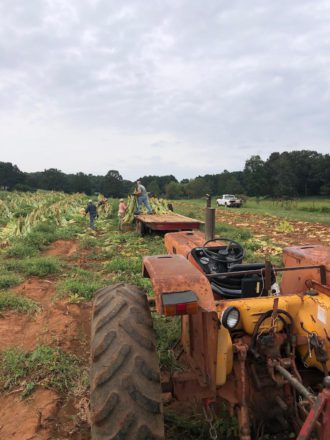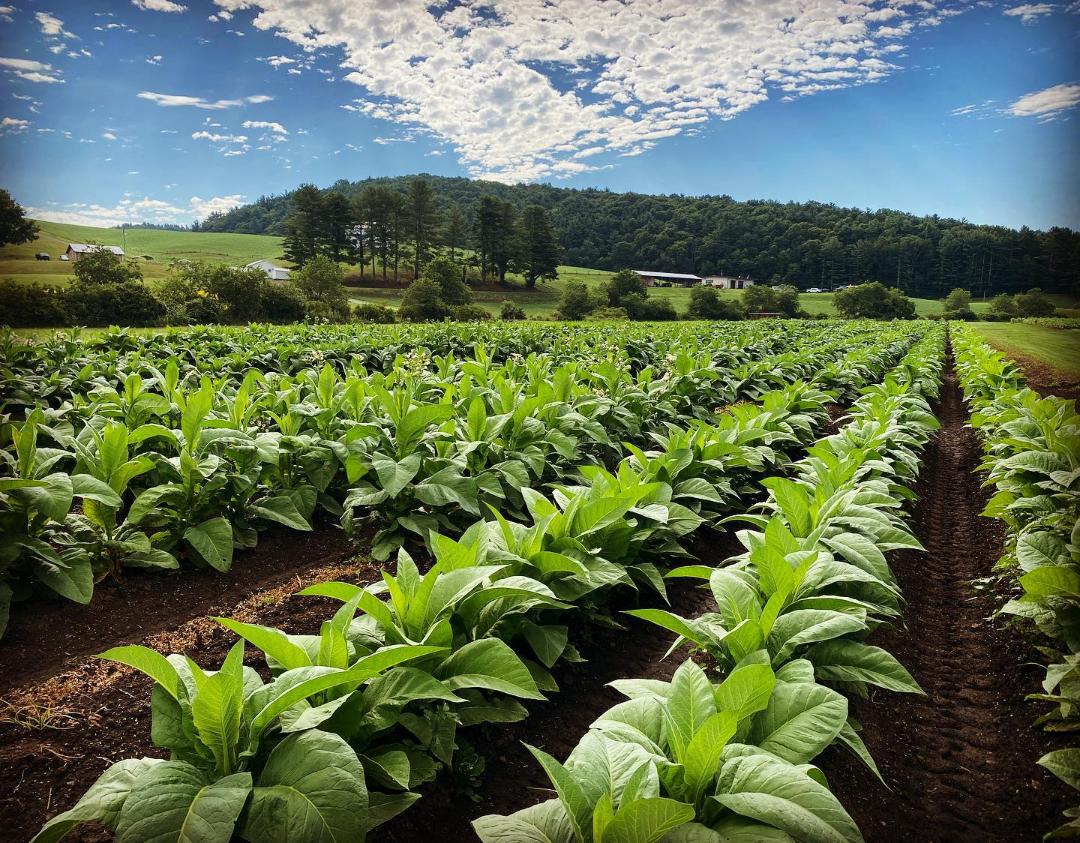Driving between his home in Spruce Pine and his family’s Stonbach Farms in rural Mitchell County, Conner Stonbach says he used to see tobacco growing everywhere. But that was in the early 2000s — now, he says, “We’re one of the last ones left.”
Stonbach isn’t exaggerating. The U.S. Department of Agriculture estimates that about 300 acres of burley tobacco, the variety traditionally grown in Western North Carolina, were harvested across the entire state in 2020. And the Asheville-based Appalachian Sustainable Agriculture Project has found that the number of regional tobacco farms fell by 97% between 1997 and 2012.
That drastic decline was driven by the federal Fair and Equitable Tobacco Reform Act of 2004, commonly known as “the buyout,” which eliminated market protections for domestic tobacco. Profit margins have since decreased, Stonbach says, while production costs have continued to rise. He admits there isn’t much money in the crop anymore.

Nevertheless, Stonbach has been growing tobacco since he was 10 years old, and his father has 40 years under his belt; neither intend to stop. Pride and tradition have kept them in the tobacco fields, even as they’ve had to rely on other sources of income like beef cattle and vegetables to keep the farm afloat.
“Many people nowadays would stay away from it because it’s so much work, but it’s just something we enjoy doing,” says Stonbach. “We joke and say it’s in our blood.”
Matthew Vann, tobacco extension specialist and assistant professor at N.C. State University, thinks there may be a viable new crop for farmers like Stonbach: cigar wrapper tobacco. Unlike burley tobacco, which is shredded and used for cigarette filler, wrapper tobacco leaves must be free from blemishes, holes, sunburns and discoloration. And that quality commands a premium price, up to $6 per pound — roughly triple the going rate for burley.
Give it a try
Over the past two years, the N.C. State Extension and N.C. Department of Agriculture and Consumer Services research stations have experimented with growing cigar wrapper tobacco. Much of that work has taken place in WNC, supported by the Mountain Research Station in Waynesville and Upper Mountain Research Station in Laurel Springs.
“There is a learning curve. It is a relatively steep learning curve,” Vann acknowledges about the crop. While burley tobacco does well with nutrient-deficient soil, wrapper tobacco requires careful fertilization so that leaves will be pliable enough to stretch around a cigar. The plants also require gentler handling and attentive pest control.
But after a dodgy first year, Vann says, the research stations used their lessons learned to successfully grow a larger, commercially viable tobacco crop in 2020. Heading into a third research season with a $60,000 grant from the NCDACS, he’s optimistic and believes that the results will translate to growers throughout the region.
Chad Moody, research operations manager at the Mountain Research Station, explains that farms willing to invest time and energy into learning the new crop are likely to have the most success. “It’s not a perfect fit for everybody,” he says, but cigar wrapper tobacco is well suited for the small operations that have historically defined the region.
According to the USDA, the average farm size across WNC counties was just under 90 acres in 2017, the year of the most recent Census of Agriculture. That’s less than half of the 182-acre state average and much less than the 441-acre national average.
A new leaf
Despite an overall decrease in sales of tobacco products, Vann says there has been an increase in global demand for cigar wrapper tobacco. U.S. regions that have traditionally grown the crop — the Connecticut River Valley and the counties surrounding Lancaster, Pa. — are maxed out. Tobacco companies have begun looking to farmers in Tennessee, Kentucky, Virginia and North Carolina, states that have led the nation in burley and flue-cured tobacco production, to fill the need.
Vann suggests that WNC is the perfect growing region for cigar wrapper leaves. “You’ve got to have the right climate, the right air temperature, the right rainfall and the right soil type,” he says. “We have a great advantage in North Carolina because of our growers’ experience with tobacco and because of our state extension system and our research system. We can do the research and get the information to the farmers to set them up to be successful moving forward.”
Backed by that research, farmers in North Carolina are slowly working the crop into their fields. Vann estimates that there were about a dozen cigar wrapper tobacco growers in the state in 2019, with more coming online each year since. And he says tobacco companies are beginning to offer support such as free seeds, growing advice and temporary price guarantees.
Stonbach, who only recently heard of cigar wrapper tobacco, says he’s interested to learn more and is excited about potentially growing the new crop. A more profitable product, he says, could lead to “upgrading equipment, expanding production and possibly even buying more land.” But most of all, it would increase his pride in growing tobacco.






What about hemp?
Hemp is a high-cost, high-risk crop and for some growers it hasn’t been as profitable as expected.